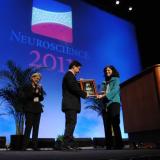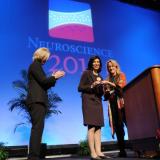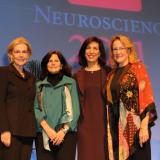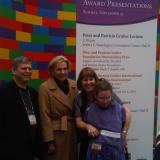2011 Gruber Neuroscience Prize
Through her pioneering research, neuroscientist Huda Y. Zoghbi, MD, has unlocked the genetic and molecular mysteries of a number of devastating neurological disorders. Her first major discovery was the identification of the mutation in the gene ATXN1 that is responsible for spinocerebellar ataxia type 1, a neurodegenerative disorder characterized by a progressively worsening of problems with movement. A few years later, in 1999, Zoghbi’s lab identified the mutation in the gene MECP2 that causes Rett syndrome, an autism spectrum disorder. Before that discovery, it was not even clear that this brain disorder was genetic. Another major finding from Zoghbi’s lab has been the identification of Math1, a kind of “master gene” that is critical to the formation of hair cells in the inner ear and of specialized neurons in the cerebellum involved in balance and proprioception (the unconscious sense of one’s position in space). Math1 is also a factor in the development of a common brain tumor called medulloblastoma, which affects children and young adults.
2011 Neuroscience Prize Recipient
Laureate Profile
Although she initially trained to be a clinical pediatric neurologist, Huda Y. Zoghbi, MD, soon found herself drawn to research. “I was encountering a lot of patients who had devastating neurological problems, and many of them were genetic,” she recalls. “All we could do was make a diagnosis, but we didn’t know the cause.” In 1988, after completing a postdoctoral fellowship with Dr. Arthur L. Beaudet in the Institute of Molecular Genetics at Baylor College of Medicine in Houston, Texas, Zoghbi started her own research lab at Baylor. She has remained there ever since.
Zoghbi’s clinical background has informed her research. “Her work seamlessly combines top-down (clinical neurology) and bottom-up (basic genetics and molecular neuroscience) research strategies to generate new biological insights and new ideas for treatment,” noted a nominator for the 2011 Gruber Neuroscience Prize. In 1993, Zoghbi identified the mutation in the gene ATXN1 that is responsible for spinocerebellar ataxia type 1, a deadly neurodegenerative disorder characterized by a progressively worsening of problems with movement. A few years later, in 1999, Zoghbi’s lab identified the mutation in the gene MECP2 that causes Rett syndrome, an autism spectrum disorder. Before that discovery, it was not even clear that this brain disorder was genetic.
Another major finding from Zoghbi’s lab has been the identification of Math1, a kind of “master gene” that plays a critical role in the formation of hair cells in the inner ear as well as specialized neurons in the cerebellum involved in balance and proprioception (the unconscious sense of one’s position in space). Math1 is also a factor in the development of a common brain tumor called medulloblastoma, which primarily affects children and young adults.
Zoghbi has continued her investigations into the genetic and molecular underpinnings of these and other neurological disorders. Her pioneering work has inspired many other researchers in the broad field of neurological disorders, and serves as an exemplar of how complex brain disorders can be better understood by basic genetics and molecular neuroscience.
“Most people go into science because they’re curious about something,” she adds. “ I have to say that I went into it to discover something that might help the patient.”
Citation
The Peter and Patricia Gruber Foundation proudly presents the 2011 Neuroscience Prize to Huda Zoghbi for her pioneering work on revealing the genetic underpinnings of neurological disorders.
Huda Zoghbi discovered that mutations in the MECP2 gene cause Rett syndrome, an autism spectrum disorder. Her work on MECP2 offers a new understanding of gene regulation in brain disorders and opens a new approach to studies of autism and other psychiatric disorders. She also illuminated the genetic basis of several spinocerebellar ataxias and provided insights on the role of protein aggregation in neurodegeneration.
Huda Zoghbi’s work has inspired many other researchers in the broad field of neurological disorders, and serves as an exemplar of how complex brain disorders can be better understood by basic genetics and molecular neuroscience.















































